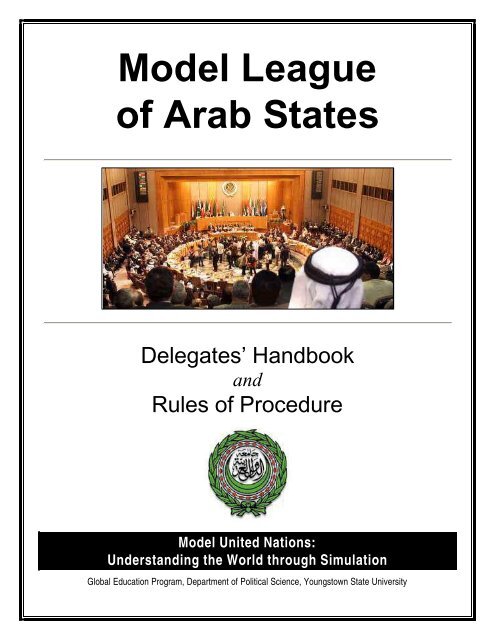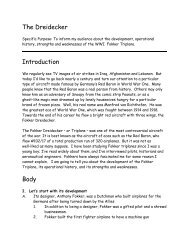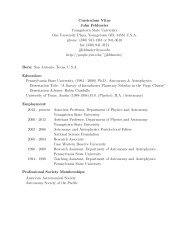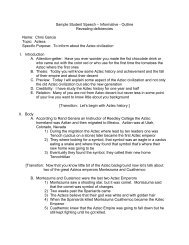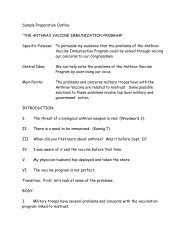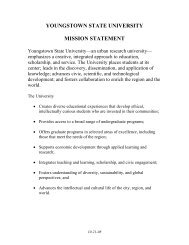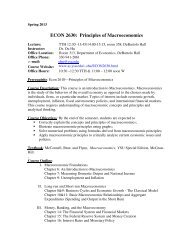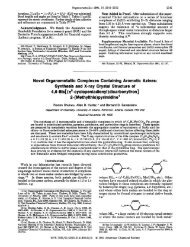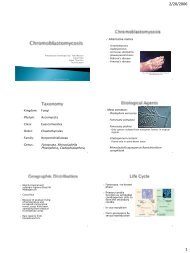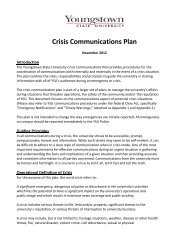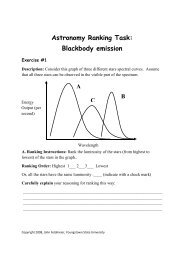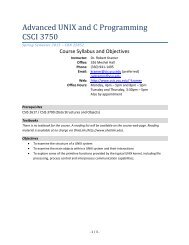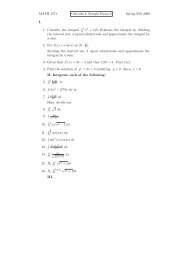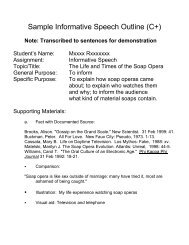Model League of Arab States - Youngstown State University
Model League of Arab States - Youngstown State University
Model League of Arab States - Youngstown State University
You also want an ePaper? Increase the reach of your titles
YUMPU automatically turns print PDFs into web optimized ePapers that Google loves.
<strong>Model</strong> <strong>League</strong><br />
<strong>of</strong> <strong>Arab</strong> <strong><strong>State</strong>s</strong><br />
Delegates’ Handbook<br />
and<br />
Rules <strong>of</strong> Procedure<br />
<strong>Model</strong> United Nations:<br />
Understanding the World through Simulation<br />
Global Education Program, Department <strong>of</strong> Political Science, <strong>Youngstown</strong> <strong>State</strong> <strong>University</strong>
Copyright © 2004 Global Education Program<br />
Department <strong>of</strong> Political Science, <strong>Youngstown</strong> <strong>State</strong> <strong>University</strong><br />
Series Editor: Dr. David Porter, Ph.D.<br />
2004 Editor: David Porter, Ph.D.<br />
Authors: Dr. David Porter, Ph.D., Matthew Vansuch<br />
2004 Secretary General: Aaron Dragres<br />
Sources<br />
Cover picture <br />
LAS logo <br />
Figure 1 <br />
Figure 2 <br />
Figure 3 <br />
The clipart was obtained from the Micros<strong>of</strong>t Clipart Gallery <br />
The Global Education Program (GEP) is sponsored by the Department <strong>of</strong> Political Science, <strong>Youngstown</strong> <strong>State</strong> <strong>University</strong>, <strong>Youngstown</strong>, OH 44555.<br />
David Porter, Ph.D., Pr<strong>of</strong>essor <strong>of</strong> Political Science, Director, phone (330) 941-3436, email dsporter@ysu.edu.<br />
The mission <strong>of</strong> the Global Education Program is to develop, sponsor, and promote academically oriented extracurricular student programs designed to<br />
increase global awareness, cross-cultural understanding and sensitivity, while providing a forum for students to explore international events and<br />
issues that will shape their future. The Global Education Program pursues its mission through cooperation with community groups, area schools, and<br />
by sponsoring a variety <strong>of</strong> programs designed to serve YSU students, and the students <strong>of</strong> the university’s greater service area. For more information<br />
on the Global Education Program please contact Dr. Porter or the Political Science Department, <strong>Youngstown</strong> <strong>State</strong> <strong>University</strong>, inquires should be<br />
mailed to Global education Program, Political Science Department, <strong>Youngstown</strong> <strong>State</strong> <strong>University</strong>, One <strong>University</strong> Plaza, <strong>Youngstown</strong>, Ohio, 44555-<br />
0001.<br />
.
Introduction to the <strong>Model</strong> <strong>League</strong> <strong>of</strong> <strong>Arab</strong> <strong><strong>State</strong>s</strong><br />
What began as a British plan to shore up support against the Axis powers in 1942 has developed into the<br />
foremost international body representing the Islamic states in the Middle East. The Egyptian government formally<br />
proposed such an idea in 1943. The idea <strong>of</strong> an “<strong>Arab</strong> <strong>League</strong>” <strong>of</strong> the various <strong>Arab</strong>ian countries united under a single<br />
“<strong>Arab</strong>” banner was proposed, but the potential loss <strong>of</strong> self-rule that could result from a total union led many <strong>Arab</strong><br />
states—including Egypt—to push for an organization that would lead to closer cooperation without the previously<br />
mentioned losses.<br />
Figure 1 Representatives from the future<br />
charter members <strong>of</strong> the <strong>League</strong> meet at<br />
Anotniadess Palace in Alexandria on 25<br />
September 1944 to discuss preparations for<br />
the <strong>League</strong>’s establishment. The resulting<br />
document, the “Alexandria Protocol,” detailed<br />
the organization’s goals, objectives, and<br />
structure. It was signed at Farouq I <strong>University</strong><br />
on 17 th October 1944.<br />
PLO representing it at its summit meeting in Rabat, Morocco.<br />
The original charter <strong>of</strong> the <strong>League</strong> established a regional<br />
organization <strong>of</strong> sovereign states that was neither a union nor a federation <strong>of</strong><br />
independent states. The <strong>League</strong> hoped to win the independence <strong>of</strong> all<br />
<strong>Arab</strong>s still under colonial rule and to prevent the Jewish minority in the<br />
British-governed territory <strong>of</strong> Palestine from creating an independent Jewish<br />
state. When Israel declared independence in 1948 despite attempts to<br />
block its establishment, the <strong>League</strong>’s reputation suffered greatly during its<br />
infancy. The initial seven members <strong>of</strong> the <strong>League</strong> were Egypt, Iraq,<br />
Lebanon, Saudi <strong>Arab</strong>ia, Syria, Transjordan, and Yemen, all <strong>of</strong> which signed<br />
the Pact <strong>of</strong> the <strong>Arab</strong> <strong>League</strong> on 22 March 1945. Since then, numerous<br />
countries have joined, for a current total <strong>of</strong> 22 (plus Palestine). In 1979,<br />
Egypt was suspended from membership because <strong>of</strong> its signature to the<br />
Camp David Accords and was not readmitted until 1989. The second<br />
<strong>League</strong> summit, held in Alexandria in September, helped gave birth to the<br />
Palestinian Liberation Organization and the Palestinian Liberation Army. In<br />
1974, the <strong>League</strong> proclaimed the PLO to be the sole representative <strong>of</strong> the<br />
Palestinian people and admitted the <strong>State</strong> <strong>of</strong> Palestine into its fold with the<br />
Figure 2 Current members <strong>of</strong> the <strong>League</strong> <strong>of</strong> <strong>Arab</strong> <strong><strong>State</strong>s</strong>.<br />
Egypt, Iraq, Jordan, Lebanon, Saudi <strong>Arab</strong>ia, Syria, Yemen – 1945; Libya – 1953; Sudan – 1956; Morocco and<br />
Tunisia – 1958; Kuwait – 1961; Algeria – 1962; Oman, Qatar, and United <strong>Arab</strong> Emirates – 1971; Mauritania – 1973;<br />
Somalia and the <strong>State</strong> <strong>of</strong> Palestine – 1974; Djibouti – 1977; Comoros – 1993<br />
<strong>Model</strong> <strong>League</strong> <strong>of</strong> <strong>Arab</strong> <strong><strong>State</strong>s</strong> Handbook and Rules <strong>of</strong> Procedure Page 1
Objectives<br />
The <strong>League</strong> is a national and regional organization that seeks to promote closer ties among member-states<br />
and co-ordinate their policies and their economic, cultural, and security plans with a view to developing collective cooperation,<br />
protecting national security and maintaining the independence and sovereignty <strong>of</strong> member-states; thereby<br />
enhancing the potential for joint <strong>Arab</strong> action in all fields. 1<br />
The <strong>League</strong> uses economic and social policies and activities to promote joint action and to provide the<br />
means for cooperative development, security, liberation, and economic integration. It is entrusted with defending the<br />
interests and national causes <strong>of</strong> the <strong>Arab</strong> world through:<br />
a) the implementation <strong>of</strong> joint action plans at the regional and international levels,<br />
b) coordination with regional and international organizations,<br />
c) the examination and resolution <strong>of</strong> disputes that may arise between members and to adopt whichever<br />
resolutions and measures as may be deemed necessary to settle such disputes by peaceful<br />
means.<br />
While the Charter defines the specifics <strong>of</strong> the <strong>League</strong>, it is the Alexandria Protocol that provides the longrange<br />
objectives and fundamental basis for the <strong>League</strong>. Two more documents have been regarded as<br />
complementary to the Charter; namely, the Treaty for Joint Defense and Economic Co-operation, concluded on 13<br />
March 1950, and Charter for National Economic Action, issued on 26 November 1980. All members have become<br />
parties to both instruments. 2<br />
<strong>Arab</strong> <strong>League</strong>’s Governing Structure<br />
The governing structure <strong>of</strong> the <strong>League</strong> was established in the Charter. There are five main bodies.<br />
ü Summit Conferences<br />
Summit conferences are called when the need arises. The first occurred on 13 January 1964 in Cairo, Egypt.<br />
The heads <strong>of</strong> state and government attend these sessions—12 ordinary and 11 extraordinary summits have been<br />
convened—and discuss major issues affecting the <strong>Arab</strong> community. The result is a communiqué, a type <strong>of</strong> resolution<br />
that states the general position <strong>of</strong> the leaders. These resolutions form the basis from which the other bodies work;<br />
195 have been passed. The Charter does not provide for a summit conference, yet the <strong>League</strong>’s members view<br />
them as critical to the forward progress <strong>of</strong> the organization.<br />
ü Council <strong>of</strong> the <strong>League</strong><br />
The Charter established the Council as the <strong>League</strong>’s supreme body, defining its formation, scope <strong>of</strong> authority,<br />
rules <strong>of</strong> procedure, and voting. All member states are members <strong>of</strong> the Council, and each has one vote. Unanimous<br />
Council decisions are binding on all members; majority decisions are binding only on those members that have<br />
accepted the majority decision. Financial and administrative resolutions need only be passed by two-thirds <strong>of</strong> the<br />
members to be binding upon all. In the event the Council is debating hostilities between two or more members, the<br />
aggressor nation is not permitted to vote on the resolution. Affiliate or standing committees assist the Council in<br />
conducting its work.<br />
The Council is mainly concerned with pursuing the objectives <strong>of</strong> the <strong>League</strong> and monitoring the<br />
implementation <strong>of</strong> the plans and programs adopted by the <strong>League</strong>. Through the Council, the <strong>League</strong> promotes joint-<br />
<strong>Arab</strong> action on a wide range <strong>of</strong> economic, cultural and political activities. In addition, the Council has the power to<br />
1 Retrieved from the <strong>League</strong> <strong>of</strong> <strong>Arab</strong> <strong><strong>State</strong>s</strong> home page: < http://www.league<strong>of</strong>arabstates.org/e_Las.asp?dd=goals><br />
2 Introduction to the Charter <strong>of</strong> the <strong>League</strong> <strong>of</strong> <strong>Arab</strong> <strong><strong>State</strong>s</strong>: <br />
Page 2<br />
<strong>Model</strong> <strong>League</strong> <strong>of</strong> <strong>Arab</strong> <strong><strong>State</strong>s</strong> Handbook and Rules <strong>of</strong> Procedure
amend the Charter, mediate disputes between members, act on applications for membership, and accept withdrawals<br />
from the <strong>League</strong>.<br />
Other functions include the establishment <strong>of</strong> affiliate bodies and the appointment <strong>of</strong> the Secretary-General.<br />
The Council meets twice a year—in March and September—in regular session and may convene in an extraordinary<br />
session if so requested by two or more members.<br />
The Treaty for Joint Defense and Economic Co-operation provides for the establishment <strong>of</strong> a Joint Defense<br />
Council that consists <strong>of</strong> the foreign and defense ministers <strong>of</strong> the members. Its main task is to adopt whatever means<br />
and measures it deems necessary—including the use <strong>of</strong> armed forces—to repel any act <strong>of</strong> aggression against any<br />
member and to restore peace and security. The Treaty also provides for an Economic Council. In 1977, after<br />
recognizing the importance <strong>of</strong> social issues in development, the Council reorganized the Economic Council into the<br />
Economic and Social Council.<br />
ü Technical Committees<br />
The Charter called for technical and specialized committees to assist members in discussing technical<br />
matters related to <strong>Arab</strong> cooperation. Since its inception, the workload for these committees increased and<br />
specialized ministerial councils were established to permanently discuss these issues. Three <strong>of</strong> the standing,<br />
technical committees continue to exist: Administrative Court, Investment Arbitration Board, and Higher Auditing Board.<br />
ü Secretary-General<br />
The day-to-day operations <strong>of</strong> the Agency are the responsibility <strong>of</strong> the Secretary-General. The Secretary-<br />
General is appointed by a two-thirds majority <strong>of</strong> the Council. The primary responsibility is the overseeing <strong>of</strong> the<br />
Secretariat, which is the administrative body <strong>of</strong> the <strong>League</strong> and the executive organ <strong>of</strong> the Council. The Assistant<br />
Secretaries-Generals assist the Secretary-General and oversee the various departments and agencies. The<br />
<strong>League</strong>’s current Headquarters are in Cairo, Egypt.<br />
The General Secretariat Departments include: Bureau <strong>of</strong> the<br />
Secretary-General, International Affairs, <strong>Arab</strong> Affairs, Palestine Affairs,<br />
Information Affairs, Economic Affairs, Social Affairs, Legal Affairs, Military<br />
Affairs, Administrative & Financial Affairs, Internal Audit, Institutional<br />
Development Unit, Documentation and Information Center, Principal Bureau<br />
for the Boycott <strong>of</strong> Israel-in Damascus, <strong>Arab</strong> <strong>League</strong> Center in Tunisia City,<br />
and the <strong>Arab</strong> Center for Legal and Judicial Research in Beirut. There are<br />
three affiliate organs: <strong>Arab</strong> Fund for Technical Assistance to African <strong><strong>State</strong>s</strong><br />
in Cairo, <strong>Arab</strong> Music Academy in Baghdad, and Higher <strong>Arab</strong> Institute for<br />
Translation in Algiers. The Secretariat also maintains missions in various<br />
cities, including New York, London, Beijing, Brussels, and Washington,<br />
D.C.<br />
ü Specialized Ministerial Councils<br />
Figure 3 The <strong>Arab</strong> <strong>League</strong>'s first and current<br />
headquarters are in Cairo, Egypt. From 1979-<br />
1989, Tunis served as the <strong>League</strong>'s seat.<br />
The councils are designed to coordinate policies amongst <strong>Arab</strong> states. Each ministerial council holds regular<br />
meetings and proposes common policies to the Secretariat and the Council. Twelve such councils have been<br />
established: Information, Interior, Justice, Housing, Transport, Social Affairs, Youth and Sports, Health, Environmental<br />
Affairs, Telecom, Energy and Electricity, and Tourism. Each member’s corresponding government minister sits on the<br />
appropriate ministerial council.<br />
Within this category are numerous specialized <strong>Arab</strong> agencies. These include: Council <strong>of</strong> <strong>Arab</strong> Economic<br />
<strong>Model</strong> <strong>League</strong> <strong>of</strong> <strong>Arab</strong> <strong><strong>State</strong>s</strong> Handbook and Rules <strong>of</strong> Procedure Page 3
Unity, Organization <strong>of</strong> <strong>Arab</strong> Petroleum Exporting Countries (OAPEC), <strong>Arab</strong> Administrative Development Organization<br />
(ARADO), <strong>Arab</strong> <strong><strong>State</strong>s</strong> Broadcasting Union (ABSU), <strong>Arab</strong> Educational, Cultural, and Scientific Organization (ALECSO),<br />
<strong>Arab</strong> Center for the Studies <strong>of</strong> Arid Zones and Dry Lands (ACSAD), <strong>Arab</strong> Academy for Science and Technology<br />
(AAST), <strong>Arab</strong> Labor Organization (ALO), <strong>Arab</strong> Organization for Agricultural Development (AOAD), <strong>Arab</strong> Satellite<br />
Communications Organization (ARBSAT), <strong>Arab</strong> Interior Ministers Council, <strong>Arab</strong> Atomic Energy Board (AAEA), <strong>Arab</strong><br />
Industrial Development and Mining Organization (AIDMO), and <strong>Arab</strong> Civil Aviation Association. There are also a group<br />
<strong>of</strong> <strong>Arab</strong> Financial Institutions: <strong>Arab</strong> Fund for Economic and Social Development, <strong>Arab</strong> Bank for Economic<br />
Development in Africa, Inter-<strong>Arab</strong> Investment Guarantee Corporation, <strong>Arab</strong> Monetary Fund, and <strong>Arab</strong> Authority for<br />
Agricultural Investment and Development (AAAID).<br />
Conclusion<br />
Discord among its members has <strong>of</strong>ten weakened the <strong>League</strong> politically, but it has managed to settle some<br />
<strong>Arab</strong> disputes and to limit conflicts, such as the Lebanese civil wars <strong>of</strong> 1958 and 1975-76. The <strong>League</strong> has been more<br />
effective in activities fostering economic, social, and cultural cooperation among <strong>Arab</strong> states.<br />
Web Sites<br />
<strong>League</strong> <strong>of</strong> <strong>Arab</strong> <strong><strong>State</strong>s</strong> Home Page: <br />
<strong>Arab</strong> <strong>League</strong> Online – excellent background, pictures, and text not present at the <strong>League</strong>’s <strong>of</strong>ficial website:<br />
<br />
Palestinian History: <br />
BBC Quick Guide to the <strong>Arab</strong> <strong>League</strong>: <br />
Page 4<br />
<strong>Model</strong> <strong>League</strong> <strong>of</strong> <strong>Arab</strong> <strong><strong>State</strong>s</strong> Handbook and Rules <strong>of</strong> Procedure
Appendix I: Rules <strong>of</strong> Procedure<br />
<strong>League</strong> <strong>of</strong> <strong>Arab</strong> <strong><strong>State</strong>s</strong> – Council <strong>of</strong> the <strong>Arab</strong> <strong>League</strong><br />
Section 100 – The Executive Committee<br />
1. The Executive Committee shall consist <strong>of</strong> the Secretary-General, the Undersecretary-General <strong>of</strong> Parliamentary Procedure, the<br />
Undersecretary-General <strong>of</strong> Facilities, and the faculty advisor. The Executive Committee has final jurisdiction in all matters and shall not be subject<br />
to appeal. Members <strong>of</strong> the Executive Committee or duly designated <strong>of</strong>ficers may address or present written statements to any organ, committee,<br />
or other body at anytime.<br />
Section 110 – The General Powers and Limits <strong>of</strong> the Chair<br />
1. The Chair shall have no vote and remains under the authority <strong>of</strong> the Assembly in the dispensing <strong>of</strong> his/her duties.<br />
2. The Chair shall have the power to: declare the opening and closing <strong>of</strong> session, direct deliberations, insure the observation <strong>of</strong> these rules,<br />
accord the right to speak, place time limits on speakers, announce decisions, and rule on procedural questions.<br />
3. The Chair shall establish the quorum at the opening session after the review <strong>of</strong> the rules and addressing any delegate questions. All<br />
substantive votes will be based on the <strong>of</strong>ficial quorum; procedural votes shall be based on those present and voting.<br />
4. Subject to appeal, the Chair shall have the power to rule motions and amendments dilatory, if the motion is intended to disrupt or delay the<br />
normal fruitions <strong>of</strong> the Assembly.<br />
5. Except where noted, delegates may appeal any ruling <strong>of</strong> the Chair. The delegate and the Chair will explain their positions. The Chair will ask<br />
the question, “Shall the decision stand as is?” An affirmative vote supports the Chair while a negative vote supports the delegate. Appeals are<br />
procedural, requiring a 2/3 vote (negative votes) to overturn the Chair.<br />
Section 120 – Adopting the Agenda<br />
1. The first order <strong>of</strong> business is for the Assembly to set its own agenda and order <strong>of</strong> consideration from the topics provided by the Secretariat. A<br />
motion to set the order <strong>of</strong> consideration must rank (first, second, etc.) each topic assigned to the Assembly.<br />
2. When the Assembly is not debating a substantive question, any delegate may move to change the order <strong>of</strong> consideration. A motion to<br />
change the order <strong>of</strong> consideration must re-rank each topic remaining on the agenda.<br />
Section 130 – Debate<br />
1. No delegate may speak before the Assembly without the permission <strong>of</strong> the Chair. All speeches are limited to the issues before the Assembly.<br />
The Chair shall call a speaker out <strong>of</strong> order if the delegate’s remarks are not germane to the discussion.<br />
2. The Chair, or the Assembly, may limit the length <strong>of</strong> speeches.<br />
3. Delegates will be recognized by the Chair in the order that they signify their desire to speak, while providing equitable opportunities for all<br />
delegates to be heard.<br />
4. The Chair <strong>of</strong> the Assembly may call for the formal rules <strong>of</strong> debate to be suspended for informal discussions, for a specified length <strong>of</strong> time. No<br />
motions, other than a motion to move back to formal debate, will be recognized during informal debate. This is up to the discretion <strong>of</strong> the Chair and<br />
cannot be appealed.<br />
5. Previous question is moved to end debate and vote on amendments and resolutions. There shall be one speaker for and one speaker<br />
against. If the question passes, the Assembly will move into the voting procedure without delay.<br />
Section 140 – Speakers’ List<br />
1. The Speakers’ List will consist <strong>of</strong> any state wanting to speak on the current topic, resolution, and/or amendments before the Assembly.<br />
Delegates will be recognized by the Chair in the order that they signify their desire to speak, while providing equitable opportunities for all delegates<br />
to be heard.<br />
2. There may be up to three speakers’ lists open at one time (topic, resolution, and amendment). Deliberations will remain fixed on one<br />
speakers’ list at a time. The most particular (i.e. amendment) will be exhausted, and then the Assembly will proceed to the most general (i.e. the<br />
agenda topic).<br />
3. At the end <strong>of</strong> a speech, a speaker may yield his/her remaining time to: (a) the chair or (b) questions from the floor. Questions from the floor<br />
are to be addressed through the Chair. A speaker may refuse to answer questions, but by doing so, the speaker must surrender the floor.<br />
4. At the beginning <strong>of</strong> a speech, a speaker may yield remaining time to another delegate. The delegate receiving time may not yield time to a<br />
third delegate.<br />
Section 150 – Resolutions<br />
1. All resolutions must be co-sponsored by three members <strong>of</strong> the Assembly. Sponsorship may be withdrawn at any time prior to the resolution<br />
being amended. The Chair shall ask if another delegate is willing to replace the withdrawing sponsor.<br />
2. Before consideration, resolutions must be approved by the Secretary-General, or his/her representative, and be submitted to the Chair. After<br />
a delegate has been recognized by the Chair and at the end <strong>of</strong> his/her speech, the delegate may move to consideration <strong>of</strong> any resolution. Moving<br />
<strong>Model</strong> <strong>League</strong> <strong>of</strong> <strong>Arab</strong> <strong><strong>State</strong>s</strong> Handbook and Rules <strong>of</strong> Procedure Page 5
to consider a resolution is a procedural matter.<br />
3. If two or more resolutions deal with the same topic, they will be discussed in the order in which they were introduced. Voting on a resolution is<br />
a substantive matter.<br />
Section 160 – Amendments<br />
1. An amendment is anything that adds to, deletes from, or clarifies a resolution. All amendments shall be in writing and turned into the Secretary<br />
prior to consideration by the Committee. The Chair or his/her representative must approve all amendments.<br />
2. A formal amendment (unfriendly amendment) requires three co-sponsors. After a delegate has been recognized by the Chair and at the end<br />
<strong>of</strong> his/her speech, the delegate may move to amend the resolution on the floor. Voting to amend a resolution is a substantive matter.<br />
3. Friendly amendments must be approved by all the delegations sponsoring the resolution. The Chair shall confirm approval; upon<br />
confirmation, the resolution will be amended without debate.<br />
Section 170 – Voting<br />
1. Each state represented in the World Health Assembly shall have one vote. During voting, no delegate may interrupt the vote except on a point<br />
<strong>of</strong> order or point <strong>of</strong> information concerned with the process <strong>of</strong> voting.<br />
2. The voting delegate must be seated with his/her placard and will be normally conducted by a show <strong>of</strong> placards. The Chair will call for<br />
delegates to vote “Yes,” “No,” or “Abstain.”<br />
3. Decisions <strong>of</strong> the Assembly on procedural and substantive matters shall be made by simple majority vote.<br />
4. A motion to divide the question is in order after debate has ended, but before voting begins. Division only applies to resolutions and applicable<br />
amendments and is a procedural matter. There shall be one speaker for and one against. The motion must clearly state how the resolution or<br />
amendment is to be divided. The individual operative clauses may be divided and voted upon individually, but the perambulatory clauses must<br />
remain as one. If the perambulatory clause fails, the entire resolution fails.<br />
5. Any delegate may request a roll call vote when voting on resolutions or amendments. The body shall not vote on this request. The Secretary<br />
will conduct the roll call by calling upon each state individually in English alphabetical order. The delegates will cast their vote by responding “Yes,”<br />
“No,” “No with Right <strong>of</strong> Explanation,” “Abstain,” or “Pass.” After all countries have been called, the Secretary will call upon those countries that<br />
passed; they must enter a vote <strong>of</strong> “Yes” or “No.” After the initial vote, the President will ask if any state would like to change their vote.<br />
6. After all countries have voted, the Chair will announce the results.<br />
Section 180 – Points and Rights <strong>of</strong> the Delegates<br />
1. A Right <strong>of</strong> Reply is when a delegate feels that his/her personal or national dignity has been impugned by a preceding speech or statement. A<br />
right <strong>of</strong> reply allows the <strong>of</strong>fended delegate the opportunity to reply to the <strong>of</strong>fensive comment. This is up to the discretion <strong>of</strong> the Chair and cannot be<br />
appealed.<br />
2. A Point <strong>of</strong> Order is called by a delegate who feels that the rules <strong>of</strong> procedure have been infringed upon. The delegate shall immediately<br />
explain the reason for calling a point <strong>of</strong> order. The delegate shall not be able to speak on the matter before the Committee. This may interrupt a<br />
speaker, is up to the discretion <strong>of</strong> the Chair, and may be appealed.<br />
3. A Point <strong>of</strong> Information is raised when a delegate has a question concerning the proceedings <strong>of</strong> the General Assembly Committee. The Chair<br />
shall answer this question immediately, or as soon as the information is available.<br />
4. A Point <strong>of</strong> Personal Privilege is raised to express concern for the rights or comfort <strong>of</strong> the entire Assembly. This point may also be used to<br />
rectify a problem that impairs a delegate from discharging his/her duties in an effective manner. This is up to the discretion <strong>of</strong> the Chair, and cannot<br />
be appealed.<br />
Section 190 – Postpone Definitely (Table)<br />
1. A motion to Postpone Definitely pertains only to the substantive matter being debated, and must include a time for the matter to be brought<br />
back before the Assembly. There shall be one speaker for and one speaker against the motion.<br />
Section 200 – Recess/Caucus<br />
1. Recess is a break from the deliberations for the purpose <strong>of</strong> a short break, or for lunch. A caucus is a break from deliberations for the purpose<br />
<strong>of</strong> negotiations between delegates. Motions to recess or caucus must include a specified length <strong>of</strong> time. The Chair may limit the length <strong>of</strong> a recess<br />
or caucus and may require caucuses to remain in the meeting room.<br />
Page 6<br />
<strong>Model</strong> <strong>League</strong> <strong>of</strong> <strong>Arab</strong> <strong><strong>State</strong>s</strong> Handbook and Rules <strong>of</strong> Procedure
<strong>Arab</strong> <strong>League</strong> Council Parliamentary Rules - Short Form<br />
Note: this form is meant to be a short reference for the convenience <strong>of</strong> delegates and staff.<br />
Substantive Rules - Pertaining to Resolutions or Amendments<br />
Rule<br />
Resolution<br />
Amendment<br />
Friendly Amendment<br />
Comment<br />
Requires 3 co-sponsors; reviewed by<br />
Chair<br />
Requires 3 co-sponsors; adds to,<br />
deletes from, or clarifies a resolution;<br />
must be presented to the Chair in<br />
writing<br />
Informal means <strong>of</strong> amending a<br />
resolution; agreed upon by all<br />
sponsors and co-sponsors<br />
Vote<br />
Required<br />
Speakers<br />
Interrupt<br />
Speaker<br />
Second<br />
Required<br />
Majority List No No<br />
Majority List No No<br />
By Consent No No No<br />
Rule<br />
Previous Question<br />
Procedural Questions - Affecting or Pertaining to Debate<br />
Comment<br />
Used to bring debate to a close on a<br />
resolution or amendment<br />
Vote<br />
Required<br />
Majority<br />
Point <strong>of</strong> Order Correct a violation <strong>of</strong> procedural rules Chair rules<br />
Point <strong>of</strong> Information Used when a delegate has a question Chair<br />
Personal Privilege<br />
Postpone Definitely<br />
Expresses concern or rights <strong>of</strong><br />
Committee<br />
Table resolution or amendment; must<br />
state time the issue will come back to<br />
the table<br />
Chair<br />
Majority<br />
Caucus & Recess Must state time or duration Majority<br />
Appeal the Chair<br />
Right <strong>of</strong> Reply<br />
Division <strong>of</strong> Question<br />
Used to overrule procedural rulings;<br />
a yes vote supports the Chair<br />
Personal or national dignity has been<br />
impugned<br />
Must state how resolution or<br />
amendment is to be divided<br />
2/3 Against<br />
Speakers<br />
1 Against,<br />
1 For<br />
Explain<br />
violation<br />
<strong>State</strong><br />
question<br />
<strong>State</strong><br />
concern<br />
1 Against,<br />
1 For<br />
1 Against,<br />
1 For<br />
Delegate,<br />
Chair<br />
Interrupt<br />
Speaker<br />
No<br />
Yes<br />
No<br />
No<br />
No<br />
No<br />
No<br />
Second<br />
Required<br />
Yes<br />
No<br />
No<br />
No<br />
Yes<br />
Yes<br />
Yes<br />
Chair Delegate No No<br />
Majority<br />
1 Against,<br />
1 For<br />
No<br />
Yes<br />
<strong>Model</strong> <strong>League</strong> <strong>of</strong> <strong>Arab</strong> <strong><strong>State</strong>s</strong> Handbook and Rules <strong>of</strong> Procedure Page 7


